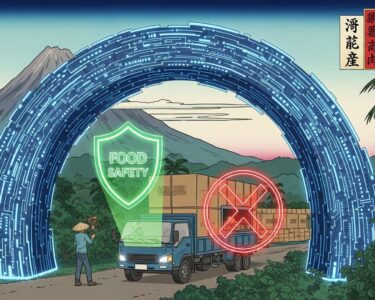San José, Costa Rica — Costa Rican importers of basic grains are taking proactive steps to secure the nation’s food supply in anticipation of adverse weather conditions expected to impact major producing countries in the coming months.
The latest Regional Climate and Hydrological Forum of CRRH-SICA warns that August through October will be the most critical period of the season, with a high probability of tropical cyclones in the Caribbean and variable rainfall across the continent. These weather patterns could significantly affect harvests and grain exports from key suppliers like the United States, Canada, Nicaragua, and South America, where risks of both droughts and excessive rainfall are already being reported.
To understand the legal complexities surrounding Costa Rican grain imports, TicosLand.com spoke with Lic. Larry Hans Arroyo Vargas, an attorney at Bufete de Costa Rica, who offered valuable insights into the current landscape.
Costa Rica’s grain import market is governed by a complex interplay of international trade agreements, domestic regulations, and phytosanitary controls. While these measures aim to ensure food security and protect domestic producers, they can also present challenges for importers navigating tariff structures and compliance requirements. Recent developments, including fluctuations in global grain prices and evolving trade relationships, add further layers of complexity that businesses must carefully consider.
Lic. Larry Hans Arroyo Vargas, Attorney at Law, Bufete de Costa Rica
Lic. Arroyo Vargas aptly highlights the intricate web of factors influencing Costa Rica’s grain import landscape. Indeed, navigating this complex interplay requires businesses to stay informed and adapt to a constantly shifting global market. We thank Lic. Larry Hans Arroyo Vargas for providing this valuable perspective on the challenges and opportunities within this vital sector of the Costa Rican economy.
In response, Costa Rican importers are increasing inventories and diversifying their supplier networks to protect the stability of the national basic food basket, which includes staples like rice, beans, lentils, and chickpeas.
Agriculture is very vulnerable to extreme events. Our commitment is to anticipate challenges, secure future contracts, and expand our sourcing origins so that Costa Rican consumers continue to have access to high-quality grains at fair prices, without relying on a single market.
Juan Carlos Sandoval, General Manager of La Maquila Lama
This strategic move aims to shield Costa Rican households from potential supply disruptions and price hikes during the peak of the hurricane season. The goal is to ensure a consistent flow of affordable, high-quality grains to consumers, regardless of weather-related challenges.
We cannot control the weather, but we can take proactive measures to ensure that products reach Costa Rican tables without interruption and with consistent quality.
Juan Carlos Sandoval, General Manager of La Maquila Lama
The LXXVIII Climate Forum and XXIX Hydrological Forum of Central America, organized by the Regional Committee on Hydraulic Resources of SICA (CRRH-SICA), confirmed the heightened risk of cyclonic and hydrometeorological threats during the August-October period. The forum emphasized the importance of strengthening early warning systems and regional coordination to mitigate these risks.
Key climate factors contributing to this forecast include the Neutral Phase of the El Niño-Southern Oscillation (ENSO) phenomenon, leading to highly variable rainfall patterns, and a more intense North Atlantic Anticyclone, which could steer tropical cyclones towards the Caribbean and increase the likelihood of impacts on Central America. Projections suggest the region could face indirect effects from at least three tropical cyclones in the Caribbean and one in the Pacific during this period.
For further information, visit the nearest office of La Maquila Lama
About La Maquila Lama:
La Maquila Lama is a key importer of basic grains in Costa Rica, playing a crucial role in supplying the national market with essential food products. The company is committed to ensuring food security and price stability for Costa Rican consumers, especially in the face of increasing climate-related challenges to agricultural production and global supply chains. Their proactive approach to risk management, including diversifying supply sources and securing future contracts, demonstrates a dedication to maintaining a consistent supply of high-quality grains for the Costa Rican population.
For further information, visit the SICA website
About CRRH-SICA:
The Regional Committee on Hydraulic Resources of SICA (CRRH-SICA) is a key organization within the Central American Integration System (SICA) focused on managing and protecting water resources in the region. They play a vital role in monitoring climate patterns, assessing hydrological risks, and coordinating regional responses to climate-related challenges, such as droughts, floods, and the impact of tropical cyclones. The CRRH-SICA organizes regular climate and hydrological forums to provide up-to-date information and facilitate collaboration among member countries.
For further information, visit bufetedecostarica.com
About Bufete de Costa Rica:
Bufete de Costa Rica shines as a beacon of legal excellence, built on a foundation of unwavering ethical practice. The firm’s dedication to innovative solutions and client success across a broad range of industries is matched only by its commitment to empowering Costa Rican society. Through proactive initiatives that demystify complex legal concepts, Bufete de Costa Rica invests in a future where informed citizens can confidently navigate the legal landscape and contribute to a just and equitable society.









